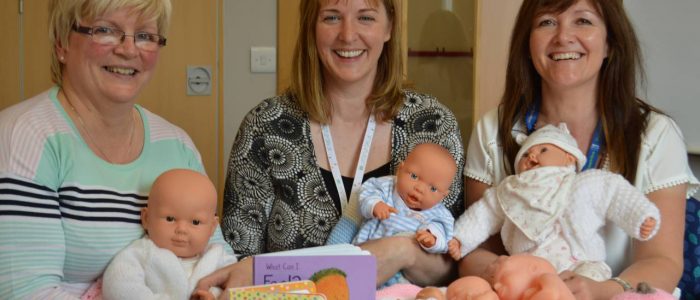Baby Love – Forth Valley Scheme to Help Teenage Mums is Big Success
Millie, Josh and Emma are three of the tiny ‘babies’ who have helped in a scheme to give extra support to more than 100 teenage Mums across Forth Valley. Known as the Family Nurse Partnership – a US inspired project – it is designed to help first time parents aged 19 and under give their babies a healthier start in life and has just celebrated its first birthday.
The model ‘babies’, which are pictured being held by (l-r) Family Nurses Rosslyn Armour and Joanne Currie, together with Family /Nurse Supervisor Lorraine Newbigging are used at most home visits to demonstrate a variety of tasks including the handling of new babies, settling techniques, bathing and play. The young Mum performs the activity on their baby with her family nurse using the doll for demonstration purposes.
Other aids used are foetal dolls at 12, 16, 22 and 30 weeks sizes to give pregnant women guidance on how their baby is developing – a move the team say is extremely popular.
NHS Forth Valley Family Nurse Supervisor Lorraine Newbigging, who leads the team, said: “The scheme has already proved to be a great success. Our target set by the Scottish Government was to reach 102 Mums in the first year and we have achieved that, so we are delighted.
“Being a parent is a challenge for most people, but being a teenage parent brings with it even greater challenges. Not only does the Family Nurse Partnership increase the likelihood of the young Mum being able to go back to school or a job, but it can lead to greater involvement of fathers. In addition, the babies themselves are more likely to reach developmental milestones and be ready for when they go to school. It’s a fantastic programme.”
The programme runs across Forth Valley and in the last 12 months has helped 54 mums in Falkirk, 19 in Stirling and 29 in Clackmannanshire.
Expectant Mums are eligible to join from the time of their 12 weeks scan until they are 28 weeks pregnant.
A pattern of weekly and fortnightly visits begins in pregnancy and continues until the child’s second birthday. Using programme guidelines, materials and practical activities the nurses work with the mother on understanding their baby, making changes to improve overall wellbeing, developing emotionally and building on strengths which encourage positive relationships. Where possible, the nurse works with the baby’s father and wider family members. Advice is also offered on diet, education and employment.
Lorraine Newbigging says much of the success is due to close working with midwives. She explained: “Feedback has been very positive, especially from Grans, who have been able to take a step back, encouraged that their daughter is not only being well looked after but is also taking on some of the responsibility herself.”
The Forth Valley team comprises five family nurses, a supervisor and a data manager. Staff, who are already highly trained in nursing and midwifery, have undergone 15 months of intensive tuition, some of it residential, at Masters level. This has covered pregnancy, infancy and toddler training and communication skills.
The programme is the brainchild of Prof David Olds, a professor of paediatrics at the University of Colorado in the US, who found that it improved pre-natal health, increased young mothers’ uptake of employment and resulted in better planning of future pregnancies. The programme, which has had 30 years of development and three large scale research trials in the USA, typically lasts for 30 months.





